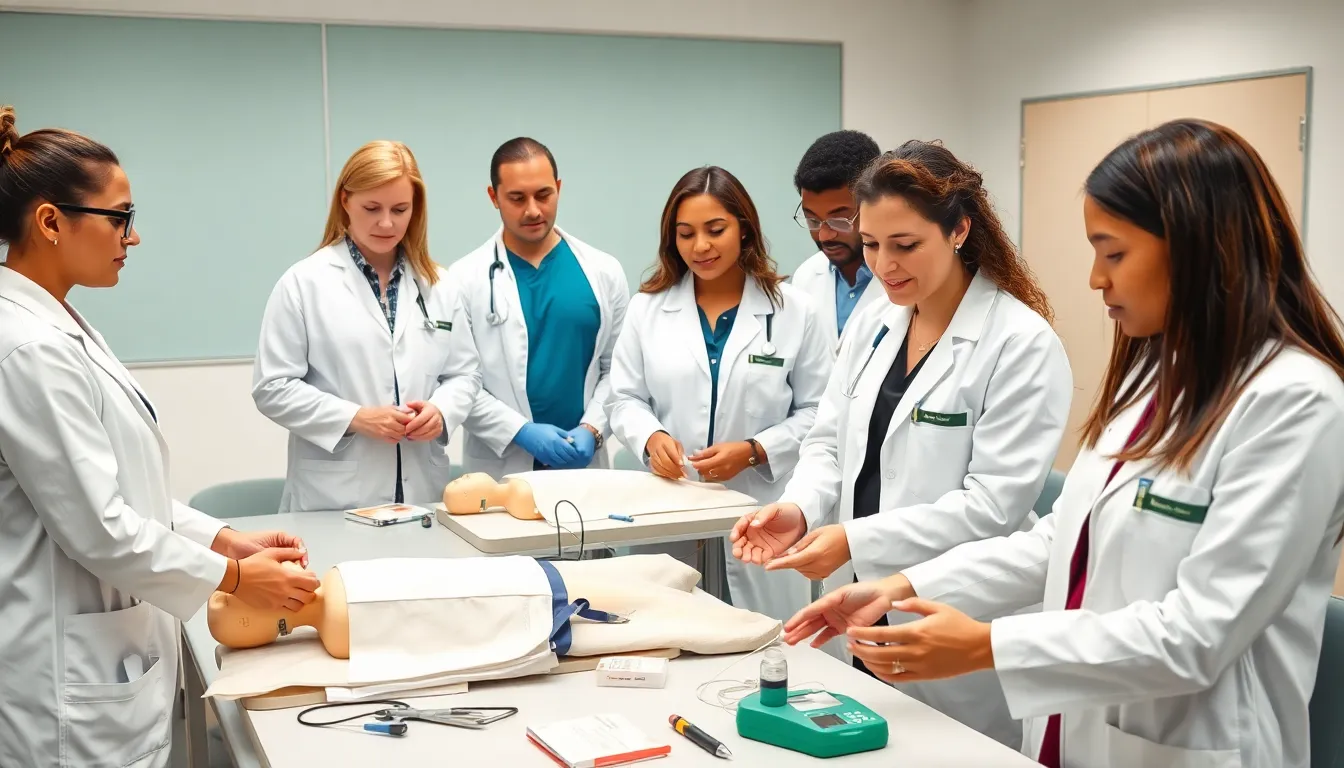Imagine wielding a needle like a superhero with the power to save lives. That’s exactly what Red Cross free phlebotomy training offers. It’s not just about drawing blood; it’s about stepping into a vital role in healthcare and making a real difference. Whether you’re a curious soul looking to switch careers or simply want to add a new skill to your toolkit, this program has you covered.
Table of Contents
ToggleOverview of Red Cross Free Phlebotomy Training
Red Cross offers a free phlebotomy training program that equips individuals with essential skills for a career in healthcare. This training emphasizes not only the technical aspects of drawing blood but also the importance of compassion and patient interaction.
Program Objectives
Participants learn to perform venipunctures effectively, ensuring patient safety and comfort during blood draws. Understanding lab procedures forms a core component of the training. Students also gain insights into the ethical and legal considerations in phlebotomy practices. Lastly, the program fosters teamwork, encouraging collaboration with healthcare professionals required to deliver quality patient care.
Eligibility Requirements
To enroll in the Red Cross phlebotomy training program, applicants must meet specific criteria. A high school diploma or equivalent is necessary for eligibility. Individuals should also be at least 18 years old to participate. Candidates with a genuine interest in healthcare and a desire to help others are encouraged to apply. Additionally, a background check might be required, ensuring safety and compliance with healthcare standards.
Benefits of Red Cross Free Phlebotomy Training

Red Cross free phlebotomy training offers valuable advantages for aspiring healthcare professionals. Participants gain essential skills and enhance their career prospects in the healthcare field.
Skill Development
Skill development remains a core focus of the training program. Participants learn proper venipuncture techniques while gaining insights into specimen handling and lab protocols. Understanding ethical guidelines and patient interaction forms a crucial part of the education. Hands-on practice allows individuals to build confidence and competence. Each session emphasizes safety and best practices to ensure high-quality patient care. Graduates emerge prepared to meet the demands of various healthcare settings.
Career Opportunities
Career opportunities expand significantly with completion of this training. Graduates qualify for roles as phlebotomists, which are in demand across hospitals, clinics, and laboratories. The program serves as a stepping stone for further education in healthcare fields such as nursing or medical assisting. Many employers value the American Red Cross certification, enhancing job applicants’ appeal in the competitive job market. Participants also benefit from networking opportunities with professionals and mentors during training, further supporting career growth.
Training Components
The Red Cross free phlebotomy training program comprises vital elements aimed at developing skilled phlebotomists. Participants engage in classroom instruction and hands-on experience, combining theoretical knowledge with practical skills.
Classroom Instruction
In classroom sessions, instructors cover critical topics such as anatomy, blood collection techniques, and patient care. Students learn about the human circulatory system and the importance of proper venipuncture methods. Ethical and legal concerns in phlebotomy also receive emphasis. Various instructional materials and resources are integrated to enhance learning. Quizzes and discussions facilitate understanding, encouraging active participation. Through this structured environment, students acquire the foundational knowledge necessary for a successful career in healthcare.
Hands-On Experience
Hands-on experience forms a core component of phlebotomy training. Students practice venipuncture techniques on training arms and with simulated scenarios. This practical application allows for skill refinement and boosts confidence. Moreover, participants gain exposure to real-life situations in clinical settings during supervised externships. Such experiences prepare graduates for immediate employment in hospitals and clinics. Continuous feedback from instructors during practice sessions ensures thorough learning. Ultimately, this practical focus underscores the program’s commitment to producing competent phlebotomists ready for the workforce.
Application Process
Enrollment in the Red Cross’s free phlebotomy training program involves a straightforward application process. Applicants must follow several key steps to gain admission effectively.
Registration Steps
Completing the online application form represents the first step. Verifying eligibility follows, which includes having a high school diploma and being at least 18 years old. Next, candidates need to pass a background check before proceeding. After this, applicants submit required documents, such as identification and transcripts, to confirm their qualifications. Finalizing the registration involves scheduling an interview, which allows program coordinators to assess the candidate’s interest and commitment.
Important Dates
Application windows for the phlebotomy training typically open twice a year. Specific dates for enrollment might vary, so checking the Red Cross website regularly for updates is crucial. Orientation sessions generally occur a few weeks before training begins, providing participants with essential information. Class start dates often fall in the spring and fall, allowing flexibility for prospective students. Keeping track of deadlines ensures applicants secure a spot in an upcoming program session.
The Red Cross’s free phlebotomy training program stands as a valuable opportunity for those eager to enter the healthcare field. By providing essential skills and hands-on experience, it prepares participants for rewarding careers as phlebotomists.
Graduates leave the program not only with technical expertise but also with a deeper understanding of patient care and ethical considerations. This training opens doors to numerous job opportunities while fostering a sense of community among healthcare professionals.
For anyone looking to make a difference in healthcare, the Red Cross program is a compelling choice that combines skill development with a commitment to compassionate patient interaction.






